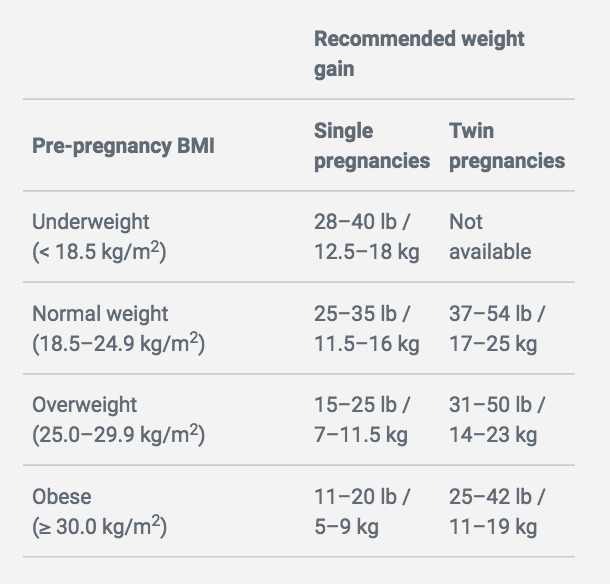
Weight gain is a good thing. But it’s still smart to keep an eye on it. So, how much should you expect to gain?
Weight gain is a positive sign of a healthy pregnancy. But if your weight increases too much or too little, it can increase the risks of some complications including premature birth, a baby that is either too large or too small for their gestational age, certain diseases (such as gestational diabetes and pregnancy-induced hypertension), and postpartum weight retention.
What’s healthy?
According to the Institute of Medicine, healthy weight gain during pregnancy varies according to the woman’s pre-pregnancy body mass index (BMI). Recommendations are also different for singleton and twin pregnancies. The table below summarizes the recommendations.

How much weight do women tend to gain?
A 2016 study of more than 1,000 scale users who had been pregnant in the past shed some light on average pregnancy weight gain. Users put on 30.0 lb (13.6 kg) on average during pregnancies carrying a single baby. Surprisingly, a significant difference is observed between first and second or higher-order pregnancies. The average weight gain for first pregnancies is 31.3 lb (14.2 kg), compared to an average of 28.0 lb (12.7 kg) for second or subsequent pregnancies.
How much weight gain comes in each trimester?
Pregnant women typically gain approximately 2–6.5 lb (1–3 kg) in the first trimester. It is during the second and third trimesters that the most weight is gained. During these trimesters, normal weight women should gain about 0.9 lb (0.4 kg) per week, and underweight women roughly 1 lb (0.5 kg) per week. Overweight women should aim for 0.6 lb (0.3 kg) per week, and obese women about 0.5 lb (0.2 kg) per week.
Where does all the extra weight go?
Your baby will probably weigh somewhere between 5.6 lb (2.6 kg) and 9.1 lb (4.2 kg) at birth, depending on when birth occurs. The rest of the weight gained is made up of fat that your body uses to store nutrients for breastfeeding, organ tissue (growth of the uterus, placenta, etc.), amniotic fluid, and increased blood volume.
What should I do if my weight gain is not in the recommended range?
Reaching a total weight gain within the guidelines is more important than being in each week’s recommended range. This means you shouldn’t worry if your weight is out of the recommended range for a few weeks — especially during the first trimester. You should pay attention if, week-after-week, your weight is consistently far from the range.
In any event, talk to your care provider and discuss your weight records with him or her. Your care provider is the one who can be counted on to steer you towards what is healthy during your particular pregnancy.
Sources:
1. Institute of Medicine. Weight Gain During Pregnancy: Reexamining the Guidelines. National Academies Press (US); 2009.
2. Deputy NP, Sharma AJ, Kim, SY. Gestational Weight Gain — United States, 2012 and 2013. Morbidity and Mortality Weekly Report. 2015;64(43), 1215-1220. doi: 10.15585/mmwr.mm6443a3.
3. Oken E, Kleinman KP, Rich-Edwards J, Gillman MW. A nearly continuous measure of birth weight for gestational age using a United States national reference. BMC Pediatr. 2003;3:6. doi: 10.1186/1471-2431-3-6.
4. 2016 survey of more than 1,000 scale users who have been pregnant at least once.



